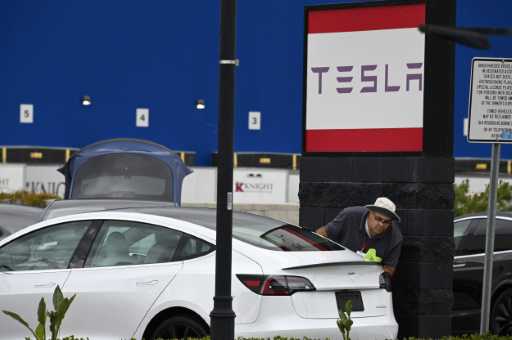Long road in advance for fully self-generating cars, despite Tesla claim

Image collected
The road to totally self-driving vehicles remains riddled with obstacles, with years of refinements likely needed, despite Tesla founder Elon Musk's claim to have the ability to produce one this season.
Musk's recommendation that Tesla is nearing "Level 5" autonomy appeared to stun the sector, which has repeatedly pushed back again forecasts for vehicles in a position to operate without human help.
The Tesla founder and CEO said in a note to a Shanghai technology fair that he was "extremely confident that 'Level 5,' or essentially complete autonomy, may happen... very quickly."
He maintained that he expected "the essential functionality" of Level 5 to be "complete this season."
But analysts mention the pledge appeared to be hyperbole from Musk, who had pledged to deliver self-driving cars by 2018, and recently promised to deploy robo-taxis by 2020.
"We're still quite a distance from a true Level 4 system, therefore the 'very close to Level 5' comment appears out of nowhere, specifically given the reset people have had recently," explained Paul Lewis, who heads insurance policy exploration at the nonprofit Eno Center for Transportation.
Lewis said there is "tremendous excitement" several years ago about the prospect of full autonomy, but it has since waned.
"Technology developers are needs to realize the restrictions of artificial cleverness and the great things about the mind in handling many of these tasks."
Raj Rajkumar, a Carnegie Mellon University engineering professor and co-director of the school's auto technology exploration lab, said he was highly skeptical as well.
The recent claim "could be just another technique by Tesla to recognize more of the revenue" from the semi-autonomous system the company uses, the researcher said.
"We have been often below before," Rajkumar explained, citing Tesla's prior pledges on full autonomy.
Tesla is in a fierce competition with tech firms and other automakers for the business lead in self-driving technology.
The California electric carmaker became the world's most effective auto supplier earlier this month, and its own shares have soared amid strong demand, even while it produces only a fraction of the vehicles of many rivals.
The former Google car division now known as Waymo operates a test program in Arizona at Level 4 autonomy. Which means a vehicle will not desire a driver but operates in a geographically circumscribed location.
But Lewis said the Waymo program has restrictions because "there continues to be some degree of monitoring," with a remote system that could need a human to dominate.
Ed Niedermeyer, head of communications for Partners for Automated Automobile Education (PAVE), which includes nonprofit organizations and auto technology firms (but not Tesla) said Level 4 may be the major concentration of the group's participants.
"The reason companies are not talking about Level 5 is you are discussing drinking from the firehose of randomness," said Niedermeyer.
Level 5 means a car are designed for any situation, any sort of weather or perhaps any terrain without individual assistance -- a tall purchase, in Niedermeyer's view.
Level 4, on the other hand, would "decrease the quantity of variables," in part by operating within a particular area, whether a specific test site, a college or university campus or even a whole city.
"There's no single technical normal for Level 4; you can define it for yourself," said Niedermeyer.
Some analysts warn that promoting a system as autonomous could business lead motorists to make dangerous assumptions and neglect the tyre, with potentially fatal effects.
Tesla has been criticized over a number of accidents involving drivers which consists of "Autopilot" program.
"There exists a danger in promoting self-driving capabilities that are not accurate," Lewis said. Autopilot, he noted, is an even 2 system that requires motorists to be attentive all the time.
Niedermeyer said it is vital to educate the public about the differences around autonomy and "driver assistance devices" which dominate some functions but need a person at the steering wheel.
And regardless if the technical hurdles to full autonomy are overcome, community acceptance remains a concern, said Susan Shaheen, co-director of the Transport Sustainability Research Center at the University of California at Berkeley.
"There's not yet been comprehensive work to advance the knowledge of public AV (autonomous car) acceptance and concerns," said Shaheen, noting the possible hazards of security, cybersecurity and info breaches.
"More research is needed to understand these and other concerns," she said.
Source: https://japantoday.com
Tags :
Previous Story
- Tesla opens reservations for Cybertrucks in China
- Siemens joint venture looks to top Tesla's battery...
- Elon Musk wins defamation trial over his 'pedo...
- Ford drops an electric blue Mustang teaser on...
- Tesla will raise prices on its cars, reverses...
- Elon Musk's Tweets Keep Landing Him in Trouble...
- Tesla Gigafactory 1 Timeline & Results — CleanTechnica...
- 2 Reasons To Sell Tesla: $920M And $26,250